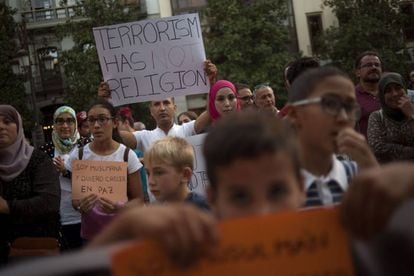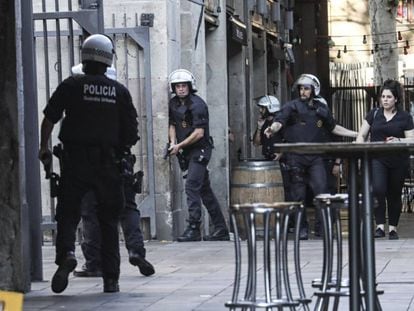Stop Islamophobia
We need to work together to avoid hatred and a lack of understanding

The only people to blame are the terrorists. We would do well to establish this fact to define the correct parameters of the debate and avoid pointing the finger at a religion that two million people practice peacefully in Spain.
The violent attacks against Muslims and mosques, as well as the statements on a number of forums, the posters, the sensationalism in some areas of the media and the verbal aggression on social networks are not acceptable in democratic society. It’s true that these kinds of xenophobic attacks have also occurred in London, Manchester and other targets of jihadist terrorism, but it is alarming how prolific they have become in Spain, not only in the past few days, but in the last two years, with 49 attacks reported in 2014, leaping to 600 in 2016.
After 11/M, Spain united against terrorism and avoided blaming the Muslim community
A gang of youths attacked a 38-year-old woman last Wednesday in the district of Usera, Madrid, and the neo-nazi group Hogar Social Madrid has put up posters plastered with hate slogans against the Muslim community. In Fitero, Navarra, two people attacked three Moroccan youngsters returning home from a vigil for the victims in Catalonia.
Another Muslim youngster was kicked by a man in Sagunto, in Valencia. The mosques in Granada, Seville, Logroño and Fuenlabrada, Madrid, have been covered with threatening graffiti. And the hashtag #Stopislam was trending on social networks the day of the attacks.
After the Madrid bombings of March 11, 2004, our society was able to unite against terrorism and avoid blaming the Muslim community. Now, the horrific series of terrorist attacks in Europe and the speed with which hate is shared on social media threatens to derail the harmony between communities. Avoiding the escalation of intolerance requires the entire population and our institutions to get to work immediately. Which is why the reaction of the Muslim community, which has not hesitated to condemn the attacks and the use the jihadists make of their religion, is to be welcomed with open arms.
It is clear that Islam is wrestling with internal conflicts and that there are powerful forces at work promoting an intolerant and violent version of the faith. This is why the struggle against jihadist terrorism has to involve the Muslim community at all levels. The leaders, both social and spiritual, are crucial in preventing and detecting hate speech and radicalization. Without the support of these communities – the first to want the phenomenon addressed – not much can be achieved.
In the last two years, 49 attacks were reported in 2014, leaping to 600 in 2016
Other countries, from Belgium to the UK, have set up initiatives to detect the sources of radicalization, approaching it from both a social and police angle with a view to getting to the root of the problem. In Spain, initiatives have sprung up, whose results should be analyzed and evaluated so we can pursue an approach that separates out the problems and thereby deals with them more efficiently.
If the debate doesn’t include the police, the judiciary and the community promoting tolerance and harmonious living, society will perceive a vacuum and that vacuum will be filled with hate.
English version by Heather Galloway.












































